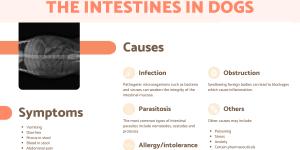Intestinal problems of Dogs
Learn more about intestinal problems of dogs by exploring our site and become a true expert on the animal kingdom. You'll find content created for the best professionals with pictures, videos and opinions.
39 articles

Updated
Updated
Deciding to share your home with a dog makes you responsible for ensuring its complete welfare. This means caring for many different aspects, which above all include providing proper socialization, adequate companionship and affection, and an optimal diet.
Dog food is highly important because it has...

Updated
Updated
As we have already mentioned in other articles, dogs are susceptible to many diseases that also affect humans. Sometimes, these familiar diseases are not serious and are only a response from the dog's organism, which is trying to cope with a situation through its own healing resources.
It is essential for...

A tummy ache is a common symptom in dogs, but it is not always easy to observe. While it is often a sign of mild gastrointestinal upset, it is also a possible symptom of a more serious illness. This is especially the case if it persists for a prolonged period. Although an upset stomach is itself a symptom...

Vomiting is one of the most common clinical signs of illness in dogs, although the severity of these illnesses range from negligible to life threatening. Mild and occasional vomiting is also different from chronic and severe vomiting. Generally speaking, if a dog has mild vomiting that doesn't persist...

As dog owners, we often want to share our food with our furry friends, but certain common foods can severely upset their digestive system and cause diarrhea. Dogs have significantly different digestive systems from humans, making them more sensitive to many foods we eat regularly. Understanding which...

Diseases of the gastrointestinal tract are among the most common medical problems in dogs. This is partly because they have many origins, including everything from an inappropriate diet to serious infectious pathologies. Common symptoms include vomiting and diarrhea, but the inflammation of the intestines can...

There may be many reasons why a dog has an upset stomach, some of which are serious and require veterinary treatment. While all symptoms will have a cause, not all will be known to us. It is common for a dog to have an upset stomach for a short period and recover quickly without us knowing the exact reason....

A tumor is a disorganized or abnormal growth of cells that occurs as a result of a genetic mutation. They can affect almost any tissue in the body where cells are able to divide and multiply, although they are more common in some areas than others. Intestinal tumors are not the most common in dogs, but...

Bloody mucus in a dog's stool can be accompanied by other symptoms which imply the dog is gravely ill. If this is the case, you will need to take them to a veterinarian immediately. Clinical signs such as lethargy, loss of appetite and vomiting imply the dog is in serious trouble. This means we can be...

Mucus in a dog's stool is a serious symptom which should never be ignored by guardians. Due to the passage through the gastrointestinal system, a thin film of mucus should be present on the exterior of the dog's feces. However, this film is not usually visible. When thick or viscous mucus is visible, this...

Also known as dyspepsia in dogs, indigestion is a relatively common gastrointestinal issue in canines, but its acuity varies greatly. It can range from a slightly upset stomach to practically incapacitating the animal. Unfortunately, our dogs cannot directly communicate their gastrointestinal status...

Abdominal distension, commonly known as a swollen belly, is a frequent veterinary complaint among dogs. It manifests as an abnormal enlargement of the abdomen, often accompanied by signs of discomfort or pain. While a mildly distended abdomen can sometimes be attributed to harmless factors like a hearty...

Constipation is not necessarily more common in small dog breeds, but the dog's size can be a factor in having trouble pooping. While it may be relatively frequent in small animals, it doesn't mean that constipation can be ignored. It can be a symptom of a more serious health concern. At the very least,...

Malt is not commonly associated with dogs. It is a product which is most commonly associated with cats. This is because its main purpose is to aid digestive transit of food through the gastrointestinal system. Since cats groom themselves regularly, they are prone to developing hairballs, something which...

Regurgitation in dogs is a relatively common phenomenon and something which shouldn't cause concern in occasional or exceptional cases. When a dog regurgitates their food regularly, it could be a pathological issue, but it may also be a behavioral problem associated with the dog's relationship with their...

Diarrhea in older or geriatric dogs is a common reason for consultation at the small animal clinic. While dogs of any age may occasionally suffer from diarrhea, diarrhea in older dogs may indicate other medical problems. This is a clinical sign that can be associated with many diseases, not just the digestive...

Inflammatory bowel disease or IBD in dogs is a chronic inflammatory condition that can affect different sections of a canine's intestine. While we know the inflammation is due to the accumulation of inflammatory cells in the intestinal mucosa, the underlying cause is not easy to define. We do know there...

Abdominal pain is a frequent reason for veterinary consultation among small animals. As dogs are expert at hiding their pain, we need to be sensitive to certain signs the dog's stomach hurts. One common symptom is trembling of the area, usually with your dog trying to prevent you from touching them....

The skin and mucus membranes of healthy dogs should have a pink hue. There are some exceptions for dogs which have dark skin or patches of skin. Since the skin of most dogs is covered in varying lengths of hair, we can usually tell the color by looking at the gums and eyes. On some dogs, you can see the...

Vomiting is a clinical symptom of various pathologies. Although vomiting is most commonly associated with gastrointestinal disorders, many problems which originate from other bodily systems occur. Whether gastrointestinal in origin, these range from mild to severe. Some of illnesses with throwing up as a symptom...

For dogs, loose stools mean there is a problem. As with humans, the quality of a dog's feces will reveal something about their overall health. Smell, consistency and color of dog stool can point us in the right direction if we suspect they have a health problem. A healthy dog should have firm stool, not...

For first time dog guardians, the amount a dog will defecate each day can seem to be a lot. Especially when they are a puppy, needing to go up to 5 times a day is considered normal. Once we have trained our dog to defecate and urinate outside the home, we are able to both able to monitor the state of...

Stinky dog poop comes with the territory as a dog guardian. A healthy dog will still pass stool that has a far-from-pleasant aroma. However, our dog's stool is a helpful indicator of their overall health. Whether they have diarrhea, blood in their stool or even if they do not poop at their normal rate,...

Gastroesophageal reflux, more commonly known as acid reflux, occurs when the contents of the stomach and the duodenum rise above the esophagus. This is because they have passed the esophageal sphincter, the valves which normally prevent food from return back from lower in the digestive tract. The ‘acid’...

It is not uncommon for dog guardians to observe their canine having diarrhea. While it does mean there is some issue with their gastrointestinal tract, it doesn't mean it is a severe condition. If your dog has diarrhea you need to monitor it for frequency. If they have diarrhea regularly, there is likely...

Understanding what healthy dog poop looks like is key when it comes to understanding a dog’s health status. Is your dog pooping white, yellow or black feces? Have you noticed white chalky dog poop on the ground instead of the normal medium brown not-too-soft poop? Your dog’s poop color and poop consistency...

Is your dog vomiting yellow liquid? Vomiting in dogs is a common problem which will naturally result in worry for any dog guardian. When the vomit is yellow with a foam, mucus or watery consistency, it is particularly concerning. Dog vomiting can be linked to poisoning, indigestion, enteritis and more....

Enteritis in dogs consists of an inflammation of the small intestine. Intestinal inflammation in dogs can appear as acute or chronic. The main symptom of enteritis in dogs is diarrhea, which can originate in either the small or large intestine.
Because canine enteritis causes diarrhea and vomiting, it...

Anyone entrusted with the care of a dog knows that vomiting is an occupational hazard. It can happen seemingly without warning, but this doesn't mean there isn't a reason behind it. Often this reason is relatively benign. It is a reflex action which can be prompted by a full stomach or rich food. There are...

Caring for our dogs requires a closeness which has many positives. We get to share their excitement, feel their love and eventually become like family. Unfortunately, our responsibility of care also requires us to look at their stool. It is not uncommon for a dog to get diarrhea at some point. While it...

Occasionally, owners might hear some grumbling or gurgling noises coming from our dogs. This is, of course, unless you have a very gassy dog. This ‘occasionally’ might be more like ‘repeatedly’. The problem is, these internal sounds make it difficult to diagnose what problem, if any, might be affecting...

Like people, dogs burp to eliminate gases in their body. Usually it is when the dog swallows too much air as they have been eating too fast. However, if they are constantly belching this can be an indication that something isn't right inside their body. Likewise, chances are it can lead to a digestive...

As is the case with humans, many canine diseases are directly related to their diet. Food can be both the cause and a natural cure for many diseases.
Gastritis is a digestive disease that can affect dogs and can be caused by several factors; however, proper diet, as well as other factors, will be fundamental...

Diarrhea in dogs is a common occurrence that will happen throughout our dog's lives. This is why it's best to get familiar to its causes and treatment. This way, you'll be able to quickly help your dog recover from an upset stomach as soon as you see them vomit.
In this AnimalWised article we're going...

Gastritis is one of the most common gastrointestinal disorders in dogs. It is the inflammation of the gastric mucosa and can be acute (sudden and short-lived) or chronic (a slow and persistent development). In either case, this disease is not usually fatal to dogs when proper treatment is provided.
In...

One of the most common canine problems is diarrhea. Be sure that sooner or later your dog will suffer from it. Remember the last time you had it: lying on the couch, blanket over you, a short distance from the bathroom.
We must be clear that diarrhea is a symptom of a gastrointestinal disease, not a...

Finding blood in your dog's feces can be shocking. Although they may appear otherwise healthy, it implies a serious internal condition which rightly causes fear in the caregiver. The causes of blood in a dog's stool are varied. It can range from a mild rectal issue to a life-threatening disease such...

Both constipation and diarrhea are common symptoms that affect dogs. These symptoms indicate changes in the intestinal transit, which are also sometimes accompanied by deficiencies throughout the digestive system.
Although these conditions are not usually serious for the dogs, they may be caused by diseases...

Unlike cats, when you put some food in a dog's bowl it usually disappears within about 3 or 4 minutes. They can really devour whatever you give them in no time at all.
Given how fast they gobble down their food, it is no wonder that they can sometimes choke. Worryingly, this can be very serious and could...
